(~6 Minute Read)
INTRODUCTION
A few months ago, we had the chance to work with Murphy Reinschreiber and the team at the Los Angeles Marathon (aka. Conqur Endurance Group). It was an incredibly interesting time because Murphy and the team were also producing the Olympic Marathon Trials the day before the Los Angeles Marathon.
Yeah, take that one in for a moment... Two major marathons over one weekend, in Los Angeles of all places. Have you been on the 405 lately?
If you're not impressed, just stop reading now. LET'S SET THE SCENE
LET'S SET THE SCENE
I swear some of these interviews can be really tough. Especially when it's with a 30-year veteran of the event world. Muprhy Reinschreiber spent a career producing many of the world's top triathlons and most recently moved over to the top of the marathon world. I guess my problem is less about coming up with questions and more about narrowing them down so the interview doesn't last a week. Even then I bet it would be interesting.
So, here goes... Enjoy, you production geeks.
MY GOALS FOR THE INTERVIEW:
- I wanted to know what it's like to go from the elite triathlon world to the major marathon world and how he approached the transition.
- I wanted to understand the team's strategic thinking around their new brand.
- And what it takes to produce two major marathons in one weekend.
As usual: if it meets your standards, feel free to share. And if it doesn't, don't :)
Ready Murphy?
Yep, I'm ready.
Where did you grow up?
I was born in Chicago. Lived there until I was 10 and then moved to Cleveland until the day after I graduated from High School. The day after graduation, I was in a car at 6:30AM headed to San Diego.
How would you describe 15 year old Murphy?
Well I think I’m currently getting a little bit of a refresher course from my 15-year-old son of what I was probably like. I was a natural swimmer and I was very good at it at a very young age, so my life primarily revolved around swimming.
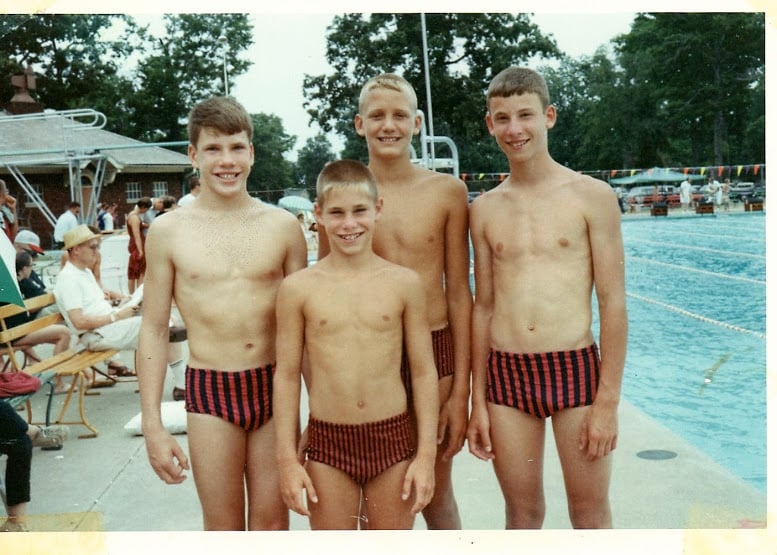
Photo Cred: The Reinschreiber family album (Murphy on the right)
Fast forward a bit. How would you describe 22 year old Murphy?
A burnt out swimmer. 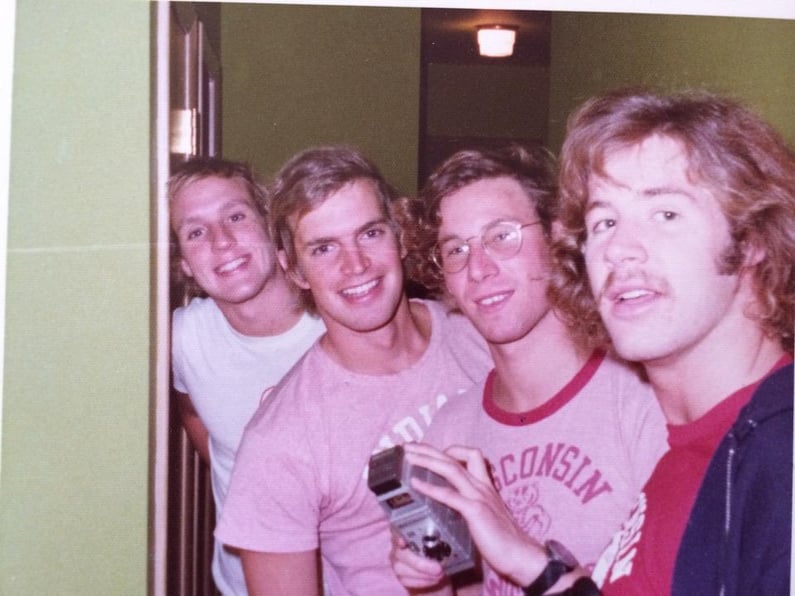
And if your friends were a little tipsy, how would they describe you?
There’s a question that’s never been asked to me before.
That’s why we do this, brother.
I guess they might say that after you get to know him, he is a really good guy.
Come on Murphy, I said tipsy, not hammered :)
Hah.
Have you ever been told you look like a certain celebrity?
Oh boy. Yes … well, there’s been two. John McEnroe, when I had hair, and now that I don’t have any hair, Patrick Stewart.
NOOO. Really? Gotta love Jean-Luc. 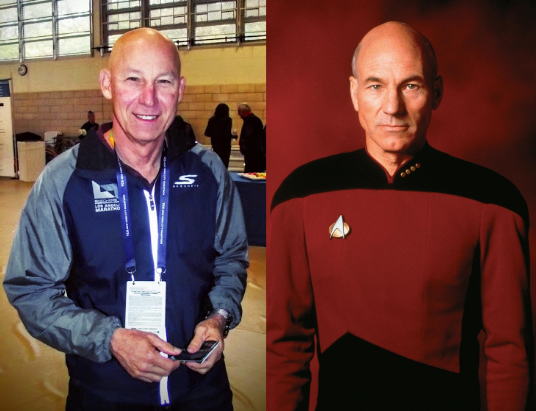
How did you get your start in the event biz?
I was a partner in a company called Road Promotions in the mid to late in ‘70s that produced a marathon that crossed the Mexican-American border. At the about the same time, we got involved with the very early triathlons down in San Diego and I worked with another group that produced a swimming event that crossed the body of water between the Coronado Islands in Mexico into Coronado Island in San Diego Bay. That’s really how everything was launched for me.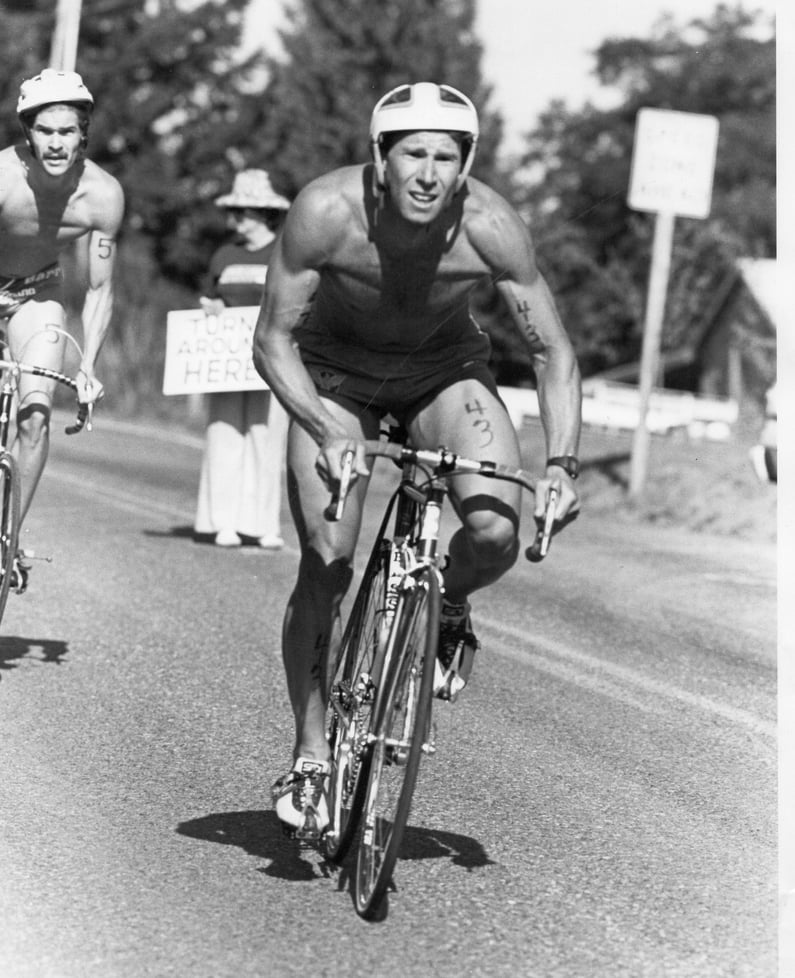
We don't spend much time on his athletic career, but let's just say he was pretty bad ass.
I'm going to throw out a few questions and just tell the first thing that comes to mind.
Sounds good.
What kind of a gun do you use at the start line?
I prefer a cannon. That makes the most amount of noise possible.
What happens if it doesn’t go off?
There’s always an air horn.
Why do they call it a bib?
That’s a really good question. I think they call it a bib because they used to use bibs, and race numbers have evolved from actual bibs (which you still see in cross-country skiing) to the smaller numbers that we have now.
Have you ever had to deal with a photo finish?
No, but we had to pay a heck of a lot to bring photo finish equipment in for third place for the Olympic trials.
What happens if there’s a false start?
That’s a good question and has been talked about a lot. I don’t believe that there really is any way to recall a false start. The answer to that is you have to be setup to anticipate that a false start can happen and make sure your timing system is ready for that.
How many Porta Potties do you end up renting for the race?
It's a lot and we wish we had a lot more.
What are the two or three ways the event industry has changed since you started?
Well, in the very early days we started some races with firecrackers. I was also involved with the triathlon that offered the first cash prize ever. Scott Tinley won it. We gave him the money, then took it back from him, and went out and bought beer with it.
But the event industry has changed a lot. To go from those early events to where we are
now—especially major city marathons—is pretty incredible. Nowadays, events businesses have to operate just like any other major industry, with competency in everything from technology to major sponsorships.
Early Days: 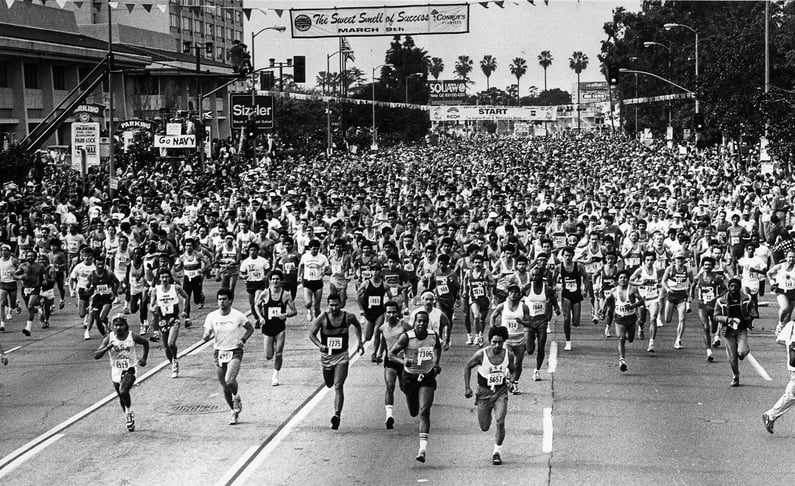
Photo Cred: LA Times - from The City of Los Angeles Marathon 1986. You know the manager of Sizzler (back left) was pumped when he saw this picture.
Nowadays: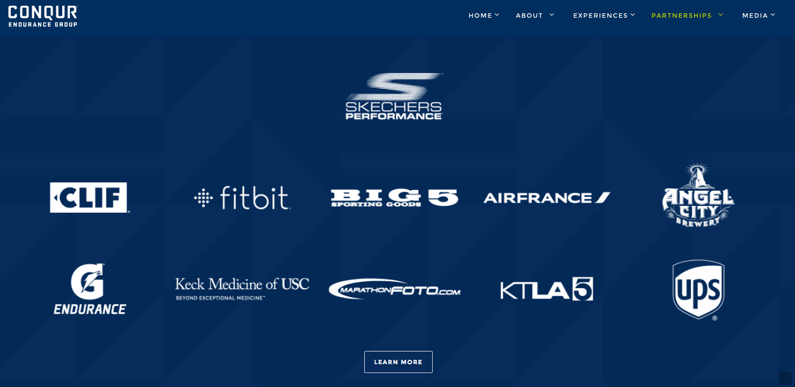
What’s the biggest difference when producing a major triathlon versus a major marathon?
Well, the fundamentals are the same. The difference is that a triathlon is a five-ring circus with three different race courses and as many as two different transition areas, plus all the different satellite functions. I can’t imagine an event that requires more versatility than producing a triathlon, but at the end of the day, when you produce a triathlon or a bike race or a major city marathon or, I suppose, a chess match—the fundamentals are all the same.
What about the complications of a point-to-point race, especially for a major event?
Look... you have to have a really compelling reason to want to go to a point-to-point race because the complexities are so much greater than an event that starts and finishes within the same area.
Everything is magnified. Ironman Melbourne, a race that I managed when I was with Ironman, had a point-to- point run. The number of aid stations doubled over a two-loop run course and bicycles had to be transported from the transition area to the finish line—a nearly impossible task because of the way people love and cherish their bikes. Lesson learned: there’s no way bikes can be transported with enough love and care to meet expectations.
It’s the same challenge we have here in Los Angeles with our point-to-point course, or New York or Boston. We have to deal with many transportation and logistics requirements that we wouldn’t otherwise face if the course started and finished in the same place.
You recently made a major branding change, why such a big shift?
Well, our rebranding tells the story of what our future perspective is. We were LA Marathon, LLC., a corporate name that told a very limited story and was very limiting in terms of how we were perceived in the marketplace. I mean, LA Marathon, LLC indicated that our business was the LA Marathon when we owned other events: the Santa Monica Classic and the LA BIG 5K. We launched the Pasadena Half Marathon this year, too.
We wanted a corporate identity that reflected the fact that we were more than just the Marathon. We also wanted a corporate identity that didn’t necessarily restrict us to running or to Los Angeles. That doesn’t mean that we’ve made any decisions to move beyond running or Los Angeles, but it does leave the door open for us to consider it.
You also made an interesting name change with the marathon: Going from LA Marathon to the Los Angeles marathon. Do you mind talking about that a little bit?
Sure. One thing that we are really trying to accomplish is to be open to new ideas and to reexamine everything that we’ve done. It’s very easy for an event of our age (more than 30 years) to become a bottling plant and just keep sending the event down the assembly line.
When the question came up of, why are we the “LA Marathon” as opposed to the “Los Angeles Marathon”—which the event was when it was initially launched—no one really knew why the change was made. This was just one of the things that our current staff inherited and no one could really make a compelling case as to why we should be the “LA Marathon” as opposed to the “Los Angeles Marathon”. There is some confusion about LA as we do get the occasional call wondering if we’re the Louisiana Marathon.
The other element that figured into our decision making was that we want to be more aggressive in our international marketing. We felt that clearly spelling out Los Angeles as opposed to LA, would be beneficial to us on an international level. Los Angeles has a lot of recognition internationally and that’s something we should capitalize on.
When you think about the potential for the marathon over the next five years, are there two or three areas that get you and your team really excited?
We did a lot last year with our branding; that was a big step up for us. While there are always some items on the course where we can improve, we do a really good job with the technical part of the race and our focus will be what we can do more to up the enjoyment and wow-factor for athletes. There is also more we can do to flesh out our “Marathon Week” that kicks off with the 26th Mile kids run that we produce with the Los Angeles Unified School District and concludes with the Skechers Performance Los Angeles Marathon. These are the things over the next few weeks and months that we’re going to be examining.
I can imagine that being able to tap into some of the resources of the entertainment industry and making that week one of the more fascinating weeks in the event world, would be a really fun challenge.
At the end of the day, the easiest way to talk about our challenge is that we want to make the marathon “more Los Angeles”. We want to create our own identity. We want to reexamine who we are, what is available to us here in our home market to make this a unique experience, and then to take advantage of that opportunity.
So, how long have you been at Conqur now?
I started October of ’14.
I actually found the press release. Pretty impressive...
"LA Marathon LLC Names Internationally Renowned Sports Executive Murphy Reinschreiber as VP of Operations"
Hah. They'll let you say anything these days.
What was your biggest focal point as VP of Operation that first year?
Learning. The learning process is endless with an event of this size. There is so much that goes on out on the course. There are so many people involved and so many little intricacies. The race runs through four cities and, until this year, the course also ran through a federally controlled VA hospital. So the first year, for new staff (me included) is a learning experience. Once you get through your first race, you have the opportunity to make a difference.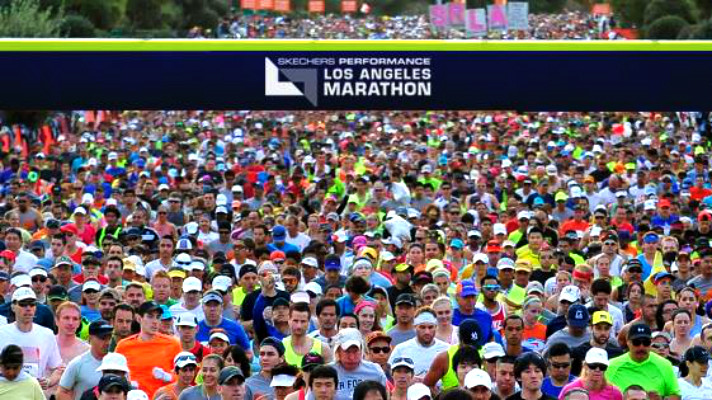
Photo Cred: Los Angeles Marathon
From an operations standpoint, what will be your biggest area of focus this next year?
I think systems, primarily. We want to do a lot upgrading of our internal systems, and that’s the area that I’ve identified that I really want to dive into—see if we can create greater efficiencies, find ways for our core staff and our extended staff to have a better understanding of the event, to be able to communicate better with each other, so that’s where I’m going to focus.
Given what happened at Boston a few years ago, how has that heightened things for you and your team?
Well, the Boston bombing changed everything. The security element and requirements of the race are dramatically different now than they were before. The amount of time, energy, and money that we spend on security, seems to multiply every year.
This is no longer about just producing a running race. There’s a second event within the event and that’s security. That second event has to be taken as seriously or more seriously than the running part. The amount of effort—time, money, energy, focus—that goes into it is draining but something you must focus on. It’s easy to say, “I just want to produce a running race,” but that’s not possible anymore.
One of the interesting by-products of the increased security demands is that we spend a lot more time with police, fire, and other agencies involved with security. It feels like our relationships with the cities and the agencies have really improved, if anything, simply due to the amount of time that we’re now spending together. Marathon planning can’t be done in a couple of weeks anymore; it’s now done over months. We’ve really come to admire the professionalism of our city partners and we hope they appreciate how buttoned-down our operations are.
So how many different agencies, public entities are you working with for the marathon since you’re going through so many different areas?
I don’t have the count on hand. Our primary security exercise connected to the event is done at a City of Los Angeles command center. There are as many as 100 ‘badges and guns’ in the main room. There is a secondary room downstairs that hosts representatives from our other City partners (Santa Monica, Beverly Hills, West Hollywood), Los Angeles county, FBI, Sheriffs, Homeland Security, etc. There are probably another 20 people in this room.
So at the end of the day, it’s two rooms full of people connected to the outside world by banks of communication devices.
Wow, and that’s a full day exercise?
It’s an action-packed half-day exercise. We’ve been fortunate that the City of LA has conducted table top exercises for the Marathon the last two years. Prepared scenarios are run to see how everybody reacts. It’s a real learning exercise and, because it’s LA, it is, of course, a Hollywood production with a “real-time” audio stream from police radio supplemented by video including news reports. You would think that the incident is actually happening in front of your eyes.
It’s an incredibly valuable learning experience for us and for the city agencies. The City doesn’t conduct many table tops and we think the reason they like to table top the Marathon is because our course is 26 miles long and multi-jurisdictional, making it one of their most challenging security operations. A marathon is not a rolling enclosure the way that a presidential motorcade is and a much longer route than a parade.
What are the pros and cons of hosting the Olympic trials, the day before your own marathon?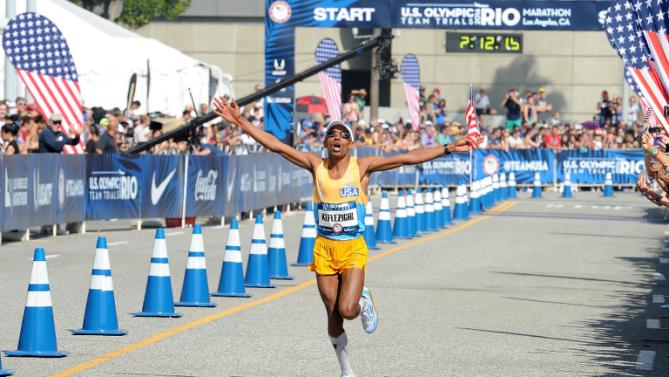
Photo Cred: Yahoo Sports
There is a lot of intrinsic value to hosting the Olympic trials, regardless of whether it was hosted the day before or if it had been in a different month. That's because of the challenge it offered to our staff.
Again, I come back to the fact that our marathon is a 30+ year-old event and it’s easy to get locked into doing things the way you have always done them. The Olympic trials was a brand new challenge for our staff, top to bottom—something that we had to create from scratch, something that had to be done at a very high level and done at the same time we were producing another major marathon.
It was quite a challenge for us, but I feel very safe in saying this, that our staff is different today than it was a year ago because of the experience that we’ve had.
If your son wanted to get into the events business, what advice would you give him?
You need to start at the bottom and understand the foundation of a large production.
What do you look for when you’re hiring someone?
Desire. It’s the desire to do the job and it’s also . . . the second would be, imagination’s an easy word, but it’s a good word. There’s lots of people that can work on an assembly line, but events that are put on an assembly line aren’t going to last long, especially in the modern events world of experience events. We need people that are very capable, but can also think outside of the box.

Desire + Imagination + Experience = The Conqur Endurance Group. Left to Right: Tracy Russell (The Boss), Ryan Cavinder, Sheri Wish, Cliff Rogers, Stacy Embretson, Murphy Reinschreiber, Carsten Preisz, Carleigh Smith, Rachel Sanchez
Parting wisdom?
I really believe that your company culture really determines the output on race day. At the end of the day, there are lots of little bits and pieces that determine whether an event succeeds or fails, but the most important element, by far, is the company culture. That’s the thing you need to think about when you wake up in the morning and when you go to bed at night.
And it's not bad having Colonal Sanders and Jean-Luc Picard (I mean Murphy Reinschreiber) on the same team.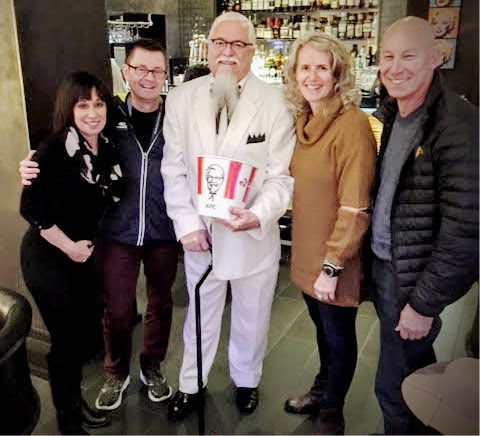
Special thanks to the Go Conqur Team (Sheri Wish, Carsten Preisz, Tracey Russell) for letting us work alongside of them during such a crazy time.
MY TAKE-AWAY
What I noticed about Murphy was that as the intensity of the event increased (leading up to and day-of), he seemed to get more relaxed. I mean, I was stressed for him. But...I guess I shouldn't be surprised, because when you've been doing something for 30+ years at such a high level, nothing is going to rattle you. Besides... when the heck did Jean-Luc ever get rattled?
UPCOMING INTERVIEWS
Rock N' Roll Marathon: Ted "The Man" Metellus", Director of Course Operations 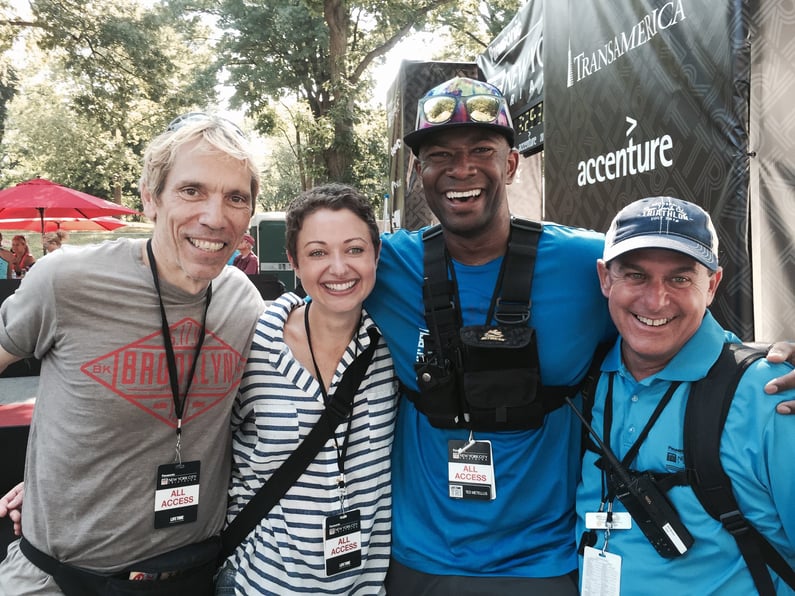
Superfly Entertainment (Bonnaroo): Kat Tooley, Senior Director, Event Production
Ironman: Roch Frey, Event Director
NFL: Katie Keenan, Director of Events
Firefly Music Festival: Megan Marshall, Assistant Director
Virgin Sport: Victoria Brumfield, VP of Global Operations
Ragnar Relay: Tanner Bell, Co-Founder & President
SXSW Interactive: Chris Valentine, Start-Up Village Director
Marine Corp Marathon: Rick Nealis, President
Beats By Dre: Jason White, VP of Marketing
Sea Otter Classic: Frank Yohannan, Founder & President
WHAT IS LENND?
Lennd is an operations and workforce management platform for events. We're currently in a private beta with some of our favorite events around the globe, but if you want to sign up for early notice as we bring on more events and organizations, you can do that here.



